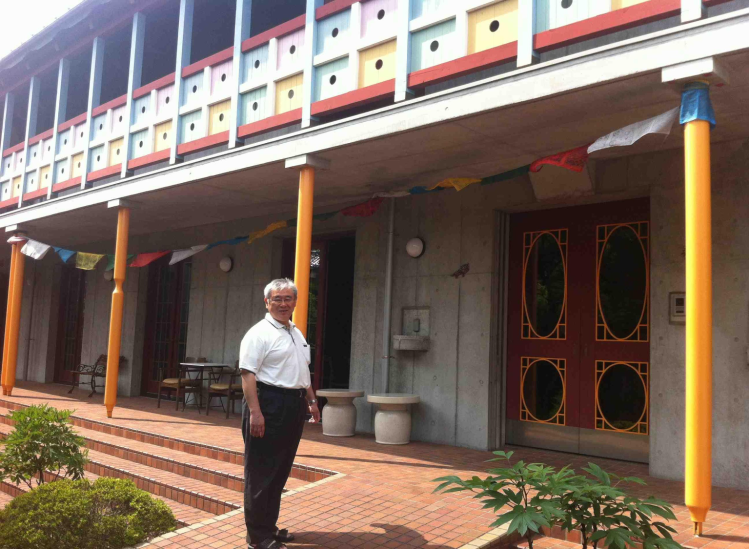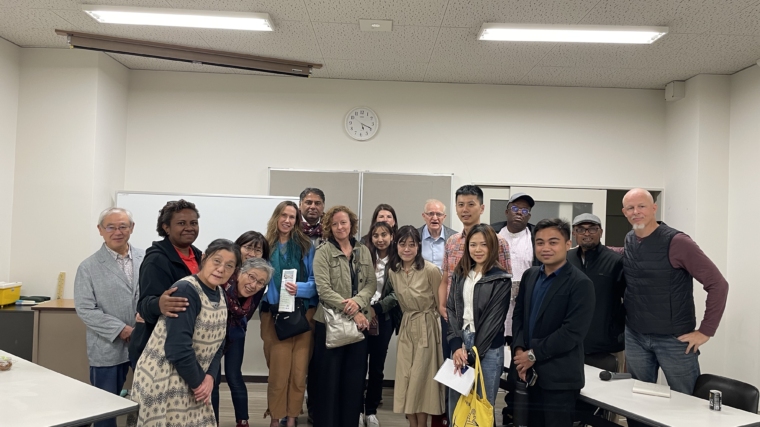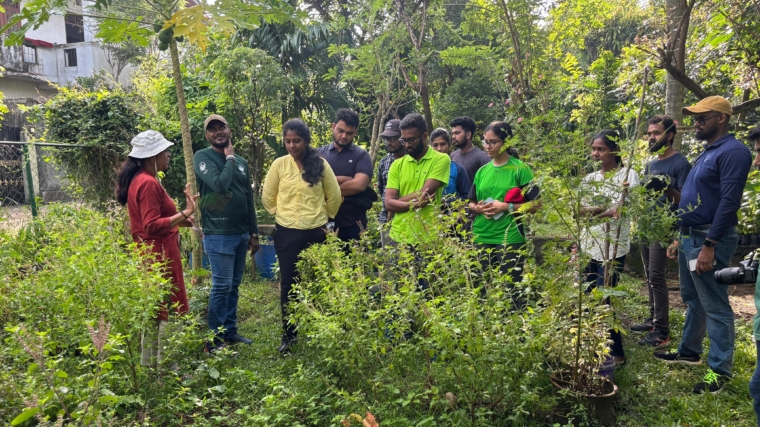Interview with Rev. Hidehito Okochi
August 1, 2024
This is an interview with Rev. Hidehito Okochi, the chief abbot of Juko-in and Kenju-in temples and founder of the Rita Citizen Asset Foundation, previously posted in Japanese on the Rita Foundation homepage.
Rev. Okochi has been engaged in “supporting community/civil society activities by utilising the temple’s land and buildings” for over 30 years. Currently, he is working to establish a new public interest foundation to formalise this experience into a more structured social framework. To raise awareness of this initiative, we spoke with him about the experiences and ideas that have guided his work, as well as his plans for the future.
How did you come to combine religious and community/civil society activities?
I was born in 1957 as the eldest son of a priest. I went to Keio University to study politics, and at first I tried to find a job, but I felt uncomfortable with what people in companies said. I thought I could contribute to a peaceful society without any ties or vested interests, so after graduating, I transferred to Taisho University to get my certification as a priest in the Jodo Pure Land sect.
After graduating from Taisho University, I joined the Zenseikyo Foundation & Buddhist Council for Youth and Child Welfare. This is a foundation established with the aim of educating and nurturing young people through Buddhist principles. It supports Buddhist Sunday schools and children’s groups, and I was responsible for training sessions on social issues affecting children. There, I met many Buddhist practitioners engaged in social activities and was inspired by them. Believing in Buddhism means believing in the power of human beings and life. I believe that my philosophy of acting as a Buddhist rather than merely preaching doctrine was formed during that time.
I worked at Zenseikyo for five years, and in 1986, at the invitation of my high school teacher, I became the secretary-general of the Tokyo District Youth Association of the Jodo sect, which had been supporting UNICEF fundraising to support maternal and child health activities in Bhutan (including vaccination and the provision of ORS/oral rehydration solutions). This became the catalyst for my involvement in NGO activities.
What did you think of the aid work for Bhutan?
I believe that my involvement in maternal and child health care had a significant impact on my subsequent social activities. The idea that “social participation and the advancement of women’s status are as important as advanced medical care in protecting children’s lives” is highly compatible with Buddhist principles. This experience further deepened my understanding of the concept and activities of primary health care (PHC) when I later participated in the activities of SHARE (Services for the Health in Asian & African Regions).
At the same time, UNICEF proposed providing assistance to Cambodia, which was isolated from the world due to civil war at the time, and I was asked to participate in a fact-finding mission to Cambodia as a representative of Tokyo Jodo Youth Association. At that time, the only organisation supporting Cambodia from Japan was the Japan International Volunteer Centre (JVC). Upon returning to Japan, I advocated for the significance of supporting Japanese organisations through the Tokyo Jodo Youth Association, which led to the establishment of a relationship with JVC. Personally, I also began participating in JVC’s activities. This was the catalyst that led me to become involved in citizen activities.

How did you come to use the land and buildings owned by the temple as public “assets”?
I became the head priest of Juko-in Temple in Bunkyo Ward in 1983, the year after I graduated from Taisho University and joined Zenseikyo. Given the size of Kenju-in Temple, it was difficult to support myself solely as a priest, so I continued to work part-time at Zenseikyo. My other temple, Juko-in in Edogawa Ward, had even fewer parishioners, and the head priest, my grandfather, originally led the life of a teacher. I began performing religious services there while I was a student at Taisho University. At the time, the temple was entrusted with managing scattered plots of land within the ward that it owned but could not properly maintain. Reorganising these properties became the main focus of my work at Juko-in.
The temple has been working to enable the assets to be utilised independently, right?
When I first began managing Juko-in, it was during the bubble economy of the late 1980s, and I began to think that I wanted to change the way Juko-in was run. I could have made more efficient use of the land and operated the temple through real estate income. However, I wanted to utilise the assets that had been passed down to me for their original purpose of religious activities. Therefore, we took advantage of opportunities, such as the relocation of tenants or the closure of businesses, to sell leasehold rights, purchase freehold rights, or exchange properties, gradually transitioning the temple to a state where it could use the land independently. Among these efforts, a factory that had been renting land ceased operations, so we acquired the first floor (approximately 50 square meters) and a portion of the second floor (approximately 74 square meters) of the Nickheim Funabori Mansion building through an “equivalent exchange” in 1986. This second-floor portion is now the Komatsukawa City Farm.
What is the Komatsukawa City Farm?
It all began in 1990 when we provided our office space to SHARE, which I mentioned earlier. The 74 square metre, Room 204, was divided into an office, a small room at the back, and a large multi-purpose meeting room, with a shower room also provided for local staff. Rather than simply renting out space, we envisioned this as a “farm” where citizens would take the lead in supporting and nurturing activities that drive social change. With this concept in mind, we have named the entire space Komatsunaka Citizen Farm.
What kind of organizations have used Komatsugawa City Farm?
Up to now, Komatsugawa City Farm has been used as an office and activity place for various civil society activities. The following organizations have used the farm so far.
- SHARE, an international health cooperative citizens’ association NPO which conducts citizen-oriented health activities.
- Yuyusha Edogawa and Yufusha, meaning literally “the house of leisurely walking and leisurely play” as communal workplaces for the mentally disabled.
- The Chittagong Hill Tribe Support Association, which provides support for minorities in the Chittagong Hill Tracts of Bangladesh.
- Citizens’ Diplomatic Center, whose activities are focused on the rights of indigenous peoples.
- Arakawa Clean Aid Forum, a non-profit organization that networks the Arakawa River basin and restores water quality and nature by picking up river litter.
- The Edogawa Citizen’s Network for Thinking about Global Warming (ECNG), nicknamed Soku-on Net, which is an NPO working to combat global warming through the promotion of solar power generation and other measures by citizens.
- Mirai “Future” Bank, the first civic non-profit organization in Japan to establish a non-profit loan system and provide loans to other NPOs.
- Edogawa Children’s Ombudsman, which aims for a civic society that utilizes the principles of the Convention on the Rights of the Child
- Julay Ladakh, which considers the future through cultural exchange with the region of Ladakh, India
- Children’s Culture and Edogawa Children’s Theatre, an NPO which nurtures children’s autonomy and creativity through artistic experiences.
- Jumma Net, which works for conflict resolution and peace promotion in the Chittagong Hill Tracts of Bangladesh.
The concept of the Komatsugawa City Farm has since spread to the entire Edogawa Ward, right?
As mentioned above, Juko-in began to provide Komatsugawa City Farm, as well as other assets owned by Juko-in in Edogawa Ward, to various municipal organizations in the form of land leased, rented, or leased at no cost. Each organization has different conditions and circumstances, and each case has been discussed with me. So the organizations have been able to use the land as they need it, not as Juko-in or I, as the head priest, have decided. The first objective of this project is to systematize the use of social assets from a broader perspective and to build a model that can be continued in the future.

What organizations are currently utilizing the assets of the temple?
As of July 2024, the following organizations and individuals are utilizing Jukoin’s assets for social purposes:
- Hotto-kan: NPO Hotto Community Edogawa is a group of homes for the elderly, community restaurants, and day care services
- Matsue House: The Edogawa Children’s Ombudsman and Soku-on Net use this vacant house for activities for children, which is also an off-grid house with energy self-sufficiency, etc.
- Tomʼs House: Tom’s residence is a shared house or shelter for those in difficult circumstances
- Amida House Kotobuki-kan: NPO Ainai-kai is a group home for 5 persons with intellectual disabilities
- Amida House Hikari-kan: NPO Kotonoha Support use the second floor of the same building as an employment transfer support office and consultation room.
- Bambino EST: This is a community welfare promotion organization with after-school daycare services for children with disabilities
- Satya J1: The Edogawa Ward Peace Action Center and NGO staff residence rents an apartment comparatively inexpensively for community residents and organizations engaged in social activities
- Edogawa Citizen Power Plants: Soku-on Net has created solar power generation systems, which are installed at Juko-in temple, the Chuo Parking Lot, Matsue House, and the Hotto-kan
- Kotonoha Dormitory: NPO Kotonoha Support is used as a group home for the intellectually disabled

Has this support for community activities brought about any changes in yourself?
I was originally a member of international cooperation NGOs such as SHARE and JVC, participating in meetings and study sessions, and even travelling to the field. What I found in common was the importance of community participation. Reflecting on this, I wondered how things were in my own community and decided to join Group KIKI. Group KIKI is a citizen group centred in the Edogawa ward, focusing on environmental and peace issues.The main members included Tetsuji Tanaka (promoter of the Forum for Global Solidarity Tax), Yu Tanaka (chairperson of the Mirai Future Bank), Masahiro Sato (representative of the Arakawa Clean Aid Forum), and Yoichi Usui. Group KIKI continued to attract residents with diverse perspectives, and the results of their study sessions were compiled into a book titled Why the National Postal Savings System Is Problematic: Finance and the Global Environment, which also gave rise to the Mirai Future Bank. Yu Yuichi, whom I met through this group, was the person who had the greatest influence on my subsequent civic activities.Through various activities with Group KIKI and its members, I gained a deep sense of trust with fellow members who shared the vision of “civil society” alongside their living circles and activity themes. This experience affirmed my belief that such relationships are essential for cultivating a truly rich, secure, and fulfilling community.
Similarly, have there been any changes in the local community?
In 1998, an organisation centred on Group KIKI and Komatsugawa Citizen Farm called on other civic groups to join them, and the Edogawa NGO University was launched. I think this was a major step forward for the promotion of civil society.This marked a major shift in our activities. The first event was themed the “50th Anniversary of the Universal Declaration of Human Rights”, and featured a lecture by Hideaki Uemura, representative of the Citizens’ Diplomatic Centre for the Rights of Indigenous Peoples and one of the key figures behind the establishment of the Edogawa NGO University. Participating organisations took turns as lecturers, sometimes inviting external speakers, and held study sessions at Komatsugawa Citizen Farm and other facilities within the ward.
The Edogawa NGO University has aimed to form a network of local organisations that share the same vision of being “stakeholders in the community”, even if they differed in their areas of expertise and themes. Concrete results were also achieved, such as the creation of the Edogawa Children’s Ombudsman from a series of study sessions on the Convention on the Rights of the Child.
After a full cycle, each organisation’s activities had developed so much that it became difficult to maintain the network, whose activities had been divided among the organisations. As a result, the Edogawa NGO University suspended its activities in 2010. Although no overall activities have been conducted since then, the Komatsugawa Citizen Farm has served as a base for pioneering activities in various fields, such as environmental issues, children’s rights, citizen finance, and human rights.
Are the achievements of the NGO University are also linked to this project?
Since the establishment of the Edogawa NGO University, activities based on real face-to-face relationships in the Edogawa ward and activities not limited to a specific physical area have been coordinated as necessary. In Buddhist terminology, this is called a “sangha” (a Sanskrit word meaning “group”, “community”, or “union”, which can also be translated as “republic” in English). In another sense, it resembles the concept of “commons”. In this project, we aim to visualise and systematise the existence and development of such a “complete civil society (commons)”, which transcends regional communities and specialised fields.
While supporting local activities, are you are also involved in civic activities as a religious leader?
Through my NGO activities, I have also established connections with religious leaders. In particular, meeting Rev. Tsutomu Shoji—former head of the National Christian Council in Japan and a prominent figure in the religious community who was involved in social activities—had a significant impact on me and taught me many things. Rev. Shoji and Rev. Tetsuen Nakajima (Abbot of Myotsu-ji Temple in Obama City, Fukui Prefecture), along with other pastors and Buddhist priests, were core members of the Inter Faith Forum for the Review of National Nuclear Policy, which transcends religious and denominational boundaries to address nuclear issues. We have engaged in advocacy efforts with government agencies, local governments, and businesses as well as appealing to and admonishing directly bureaucrats and company employees. This experience has allowed me to witness the true nature of religious leaders. I am currently serving as the secretary of the Interfaith Forum in Tokyo.

As a religious leader, I have felt the significance of engaging in social activities, so in 1993, I joined the AYUS Buddhist International Cooperation Network alongside my seniors Revs. Shigeta Shincho and Fukuda Gyoji and participated in its establishment and activities for seven years. Additionally, as part of the International Network of Engaged Buddhists (INEB), I have collaborated with Buddhist practitioners from various countries. I have also served as a board member of Arigato International, a United Nations NGO established by the Myochi-kai Buddhist denomination to promote activities for children worldwide through religious solidarity. Furthermore, since the end of the Cold War, I have focused on the Palestinian issue as a root cause of the global challenges arising from the escalation of religious and ethnic conflicts. Since visiting the region in 1991, shortly after the Gulf War, I participated in the activities of the NPO Palestine Children’s Campaign and currently serve as its representative director.
As a Buddhist, how do you view your involvement in civic activities?
What I have come to realise by attending INEB conferences overseas is that there is a global discussion about the role of Buddhism and its practical application in promoting peace, human rights, and the environment. In INEB, we engage in activities and solidarity based on the belief that bodhisattva practice, such as generosity (dana)—providing something without expecting anything in return—is the way of life for Buddhists, seeking to alleviate people’s suffering and resolve social problems. In Japan, there is a strong belief that religious leaders should devote themselves to rituals and ceremonies without engaging in secular activities. Furthermore, even when providing support to people facing difficulties, there seems to be a reluctance to delve into the social structures that led to their situation, as this could challenge existing power structures. However, if we engage in charity activities without addressing the root causes of discrimination and poverty, it will only serve to perpetuate discrimination and the structure of inequality. The founder of INEB, Sulak Sivaraksa from Thailand, clearly states that, “Buddhism is about confronting structural violence.” From this perspective, the NGOs and NPOs that delve into the essence of the suffering they have recognised and strive for true liberation and a sustainable society in accordance with correct social awareness and human rights sensibilities are, for me, a true Buddhist “sangha”.
Do you have any final thoughts to share with us?
To further develop the practices we have been pursuing at the temple over the past 30 years into a sustainable system open to the broader community, we are currently working with our friends who have been involved in our activities to establish a public interest incorporated foundation. Through this project, we aim to create a new “good network”—a “community” or “commons”—driven by people with shared aspirations, and to propose it as a model for social practice. We look forward to working with many more of you to realise this new initiative and build a better society. If you are interested, please feel free to contact us.



